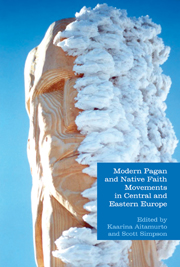Book contents
- Frontmatter
- Contents
- Contributors
- 1 Introduction: Modern Pagan and Native Faith Movements in Central and Eastern Europe
- Part I Overviews
- Part I Country Studies
- 6 Contemporary Paganism in Lithuanian Context: Principal Beliefs and Practices of Romuva
- 7 The Dievturi Movement in Latvia as Invention of Tradition
- 8 Polish Rodzimowierstwo: Strategies for (Re)constructing a Movement
- 9 Ukrainian Paganism and Syncretism: “This Is Indeed Ours!”
- 10 Russian Rodnoverie: Six Portraits of a Movement
- 11 Czech Neopagan Movements and Leaders
- 12 Neopaganism in Slovenia
- 13 Bulgarian Society and the Diversity of Pagan and Neopagan Themes
- 14 Romanian Ethno-Paganism: Discourses of Nationalistic Religion in Virtual Space
- 15 Neopaganism in Hungary: Under the Spell of Roots
- 16 Neopaganism in the Mari El Republic
- 17 A Neopagan Movement in Armenia: The Children of Ara
- Part III Thematic Studies
- Bibliography
- Index
17 - A Neopagan Movement in Armenia: The Children of Ara
from Part I - Country Studies
- Frontmatter
- Contents
- Contributors
- 1 Introduction: Modern Pagan and Native Faith Movements in Central and Eastern Europe
- Part I Overviews
- Part I Country Studies
- 6 Contemporary Paganism in Lithuanian Context: Principal Beliefs and Practices of Romuva
- 7 The Dievturi Movement in Latvia as Invention of Tradition
- 8 Polish Rodzimowierstwo: Strategies for (Re)constructing a Movement
- 9 Ukrainian Paganism and Syncretism: “This Is Indeed Ours!”
- 10 Russian Rodnoverie: Six Portraits of a Movement
- 11 Czech Neopagan Movements and Leaders
- 12 Neopaganism in Slovenia
- 13 Bulgarian Society and the Diversity of Pagan and Neopagan Themes
- 14 Romanian Ethno-Paganism: Discourses of Nationalistic Religion in Virtual Space
- 15 Neopaganism in Hungary: Under the Spell of Roots
- 16 Neopaganism in the Mari El Republic
- 17 A Neopagan Movement in Armenia: The Children of Ara
- Part III Thematic Studies
- Bibliography
- Index
Summary
INTRODUCTION
Despite growing academic interest in the new “native faiths” that have emerged in post-Socialist space, Armenian Neopaganism has remained a largely unknown phenomenon. There is no single English-language analysis that covers this subject extensively, and the short hints on this matter cannot present its multi-dimensional character. This chapter will describe the history and structure of the main Neopagan organization in Armenia—the Arordineri Ukht—and explore its interrelations with the dominant religious tradition in Armenia (Christianity, represented by the Armenian Apostolic Church), as well as analyze its nationalistic-dissident foundations and ties with nationalistic political and social movements. Finally, we will have a closer look at the Arordiner's holy scripture—the Ukhtagirk—as well as on the most important elements of the worldview and ritual system of these Neopagans.
STRUCTURE, HISTORY, AND IDEOLOGICAL FOUNDATIONS OF THE ARORDINERI UKHT
The community of Armenian Neopagans is called “Arordineri Ukht,” which means “Order of Children of Ara,” Ara being the God-Creator in their pantheon. It was founded in 1991, when Slak (Eduard) Kakosyan (1936–2005), a political dissident exiled in the 1970s from the Soviet Union, came back to the newly independent Republic of Armenia. During the years he spent in the United States, Kakosyan became familiar with the teachings of Garegin Nzhdeh (1886–1955), one of the most prominent Armenian guerilla commanders, national activists, and philosophers of the first half of the twentieth century.
- Type
- Chapter
- Information
- Publisher: Acumen PublishingPrint publication year: 2013



